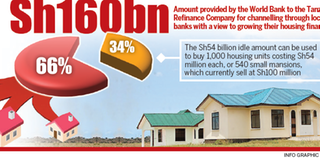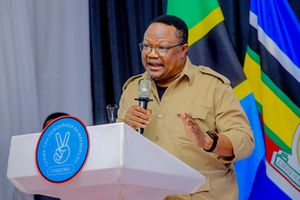Tanzania fails to use Sh54bn World Bank funds meant for housing loans

What you need to know:
The idle amount can be used to buy 1,000 housing units costing Sh54 million each or 540 small mansions, which currently sell at Sh100 million apiece. At the other extreme, the money is enough to buy 100 villas that are usually sold by private developers at Sh500 million each.
Dar es Salaam. Tanzanians have failed to fully utilise a total of $24 million (Sh54 billion) that was provided by the World Bank for mortgage financing. The unutilised money was part of the $70 million (Sh160 billion) provided by the World Bank (WB) to the Tanzania Mortgage Refinance Company (TMRC) to be channelled through local commercial banks in growing their housing finance portfolios.
The TMRC board chairman, Mr Ammish Owusu-Amoah, told The Citizen in an exclusive interview that they have asked the World Bank for an extension to June next year in efforts to utilise the offered funds to the last penny.
The idle amount can be used to buy 1,000 housing units costing Sh54 million each or 540 small mansions, which currently sell at Sh100 million apiece. At the other extreme, the money is enough to buy 100 villas that are usually sold by private developers at Sh500 million each.
“If the funds will not be utilised by June, next year, they will have to be returned to the World Bank,” the board chairman told The Citizen in a telephone interview.
The funds were meant to be channeled through the 31 commercial banks who are members/shareholders of the TMRC, using pre-finance or re-finance options.
A re-finance option involves giving out to banks which already have a mortgage portfolio in place, while the pre-financing option involves giving cash to a bank which expects to secure new mortgage finance accounts.
“The banks have failed to utilise the WB funds because they do not have customers who intend to buy or construct houses, as the amount of mortgage finance portfolios is still low,” Mr Owusu-Amoah explained.
As it is, the banks which are benefiting from the World Bank largesse are prohibited from diversifying the funds into other portfolios, and audits are regularly conducted within banks to determine actual utilisation of the funds.
The chairman further said that the member banks have failed to grow their mortgage finance portfolios because of low demand. Many Tanzanians opt to construct houses for themselves using means of financing other than bank borrowing.
“After seeing that buying a house can be a formidable challenge, some banks established a special product to enable borrowers to construct houses on their own, rather than buy an already-constructed house; but, even then, the response is low,” said Mr Owusu-Amoah, who also doubles as the managing director of Bank of Africa (BoA).
Speaking to The Citizen on the matter, a house owner in Mbagala, Dar es Salaam, Mr Mabrouk Rashid, said he took ten years to construct a three bedroom family house, but he does not remember how much he spent on the job.
“I bought the plot for Sh1.5 million in 2006 and, after two years of saving, I start laying bricks for the house, which took almost two years,” he said. “I don’t remember the actual money I spent on the construction, but it would be between Sh30 and 40 million in total, with much of money being spent in the finishing stages.”
One advantage of mortgage finance is that borrowers can repay loans for up to 25 years.
But Mr Rashid would have none of that, saying he didn’t go for bank financing because “buying a Sh40 million house can end up with one paying back more than Sh60 million in ten to 15 years, which is almost 50 per cent more of the original cost of the house”.




